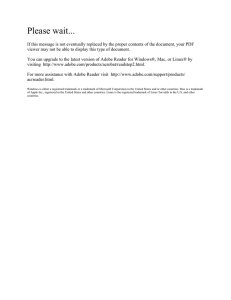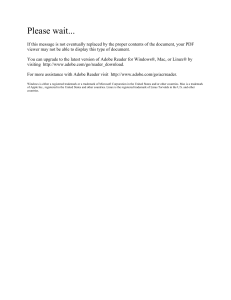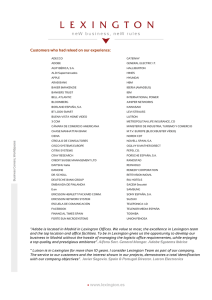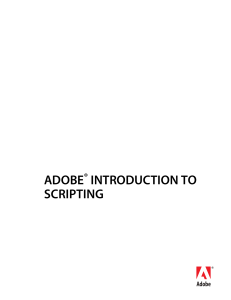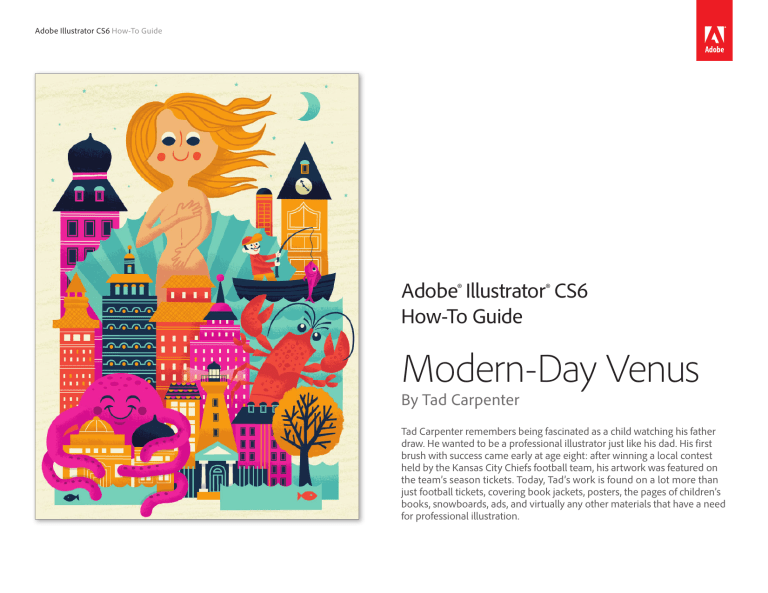
Adobe Illustrator CS6 How-To Guide Adobe® Illustrator® CS6 How-To Guide Modern-Day Venus By Tad Carpenter Tad Carpenter remembers being fascinated as a child watching his father draw. He wanted to be a professional illustrator just like his dad. His first brush with success came early at age eight: after winning a local contest held by the Kansas City Chiefs football team, his artwork was featured on the team’s season tickets. Today, Tad’s work is found on a lot more than just football tickets, covering book jackets, posters, the pages of children’s books, snowboards, ads, and virtually any other materials that have a need for professional illustration. How I work Every project starts as a series of quick sketches in my 9-by-12-inch sketchbook. It’s there where I can collect my ideas and even share them with other designers. For me, there’s something very intimate and real about creating and then sharing a pencil sketch, an idea that is still a bit rough, unpolished. I definitely find inspiration in mid-century illustration. But then again, my inspiration could come from my eclectic collections of vintage posters, old toys, or books in my studio, or simply by wandering through the antique store near our loft in downtown Kansas City. I love the challenge of taking something old and giving it a new, more modern twist. Humor is vital in my projects. I like to interject an element of something unexpected and fun in my designs— whether it’s in the font, colors, characters, or all of the above. Humor and sophistication can definitely coexist in designs. In fact, the really great designs often include both and leave people smiling. “I love bold colors and playing with the concepts of whimsy and humor in designs. I want to bring a sense of fun and joy to my illustrations and improve what people experience.” Adobe Illustrator CS6 How-To Guide 2 Getting started I looked back at Adobe Illustrator over the years and thought about how it’s continued to evolve along with the needs and opportunities facing designers. When I thought about the Venus project, I wanted to keep with this idea of evolution, putting Venus in today’s world. I placed her in a modern background to show how she can evolve and adapt to her current environment. She’s a classic image made modern. I kept some of the nautical theme by mixing the boats, fishermen, and sea creatures that would have surrounded Venus, but integrated them in a field of modern buildings and colors that we see today. The goal is a playful marrying of what’s old and what’s new, encouraging a viewer to explore how the two worlds come together. Sketch My first step was creating a new layer in Illustrator to place my pencil sketch, which acts as a roadmap throughout my entire design process. I also took advantage of a new feature in Illustrator CS6 and customized my workspace with the new user interface brightness setting—check out the light grey background. I then began to create a color palette and add background color for my illustration, which I did by adding my swatches to the swatches panel. Adobe Illustrator CS6 How-To Guide 3 A foundation for my design The next steps show how I drafted and drew various elements with my pen tool. Along the way, you can see how useful my sketch is as a guide. I like to incorporate hand-drawn patterns throughout my work, and I do so by using the Shape and Pathfinder tools in Illustrator. For example, in the image to the right you can see a hand-drawn texture with a shape on top of it. I selected the texture and the object on top and used Pathfinder Divide before placing it on the rooftop. Working with Patterns Adobe Illustrator CS6 How-To Guide 4 My next step was to use the new Pattern Creation feature in Illustrator CS6 to add patterns to several of my buildings, making adjustments to the patterns along the way. I used the patterns to bring more contrast into my design, so I created a couple types. The new patterns I created on the right are applied to some of the buildings below. “The new Pattern Creation feature in Illustrator CS6 is an easy and fast way to bring nice, varied elements to designs. The patterns are simple to create and easy to apply.” Adobe Illustrator CS6 How-To Guide 5 Building out all the elements For small details like the lobster’s antennas, I used the Width Tool to get the varied line weights that I wanted in the drawings below. Adobe Illustrator CS6 How-To Guide I continued using the Pen Tool and incorporating more hand-drawn elements. Using my pencil sketch as a guide, I drew Venus. For her nose, I applied a hand-drawn line from the Brush Panel—and did the same for her hair. 6 My completed illustration! To add more texture to background I placed hand-drawn pencil drawings into my illustration and sent them to the back before applying a color to the background overall. But it was really just a first step… Adobe Adobe Illustrator Illustrator CS6 CS6 How-To How-To Guide Guide 7 Exploring patterns further After completing my illustration, I used some of the recurring elements from the illustration to make patterns that I could apply to a shopping bag. For some of the patterns, I just started with a basic row of shapes. In Illustrator CS6 I can control how I want my pattern to look. As I created and edited the pattern while in Pattern Editing Mode, I added additional shapes and edited the various elements. After a pattern is created, it is in my Swatches Panel and can be applied quickly. Adobe Illustrator CS6 How-To Guide 8 I continued using objects from my illustration to create a series of fun patterns. The patterns were then mixed and matched to apply to a shopping bag. Like in the example below. I ended up with six pattern options, all started by selecting shapes and choosing Object> Pattern>Make to enter Pattern Editing Mode. Mock-up of the shopping bag. Image credit: Phil Lu, Adobe Systems Adobe Illustrator CS6 How-To Guide 9 “The overall aesthetic in Illustrator CS6 is fantastic. It’s cleaner and I can easily control my workspaces and panels. I can customize what the software looks like to me—to fit how I like to work.” Modern-Day Venus was commissioned by Adobe and created using Adobe Illustrator CS6. For more information Product details: www.adobe.com/illustrator Adobe Systems Incorporated 345 Park Avenue San Jose, CA 95110-2704 USA www.adobe.com Adobe, the Adobe logo, and Illustrator are either registered trademarks or trademarks of Adobe Systems Incorporated in the United States and/or other countries. All other trademarks are the property of their respective owners. © 2012 Adobe Systems Incorporated. All rights reserved.

